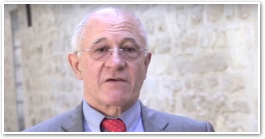Why the state needs the Church
- SAMUEL PRUVOT AND AYMERIC POURBAIX
"Temporal power needs a counterbalance," claims Rémi Brague.
 Rémi Brague
Rémi Brague
For his visit today to the Vatican and the Archbasilica of St. John Lateran, the French president, Emmanuel Macron, will be accompanied by a political delegation of at least two ministers, as well as intellectuals, the media, and volunteers. Among them is the philosopher Rémi Brague, a member of the Institute of France and a specialist in the medieval world. For him one of the key issues of the visit lies in the “spiritual counterbalance” that the Church can bring to temporal power.
He spoke with I.MEDIA/Famille chrétienne.
![]()
Why is it obligatory for a president to visit the Vatican?
Coming to Rome is a sign that we want to foster a good relationship between the Church and the State. The French philosopher Auguste Comte had the good sense to understand that civil power, whose power had increased in the modern era through industrial development, needed a counterbalance in the form of a spiritual power. Since the Church had virtually lost all its temporal power and had therefore no particular interests to defend, it was freer to take on the role of moral authority. So, without having the “armored divisions,” which Stalin had inquired about, the Church made a powerful contribution to toppling the Leninist regimes in the East. In a discreet manner, it has acted as a mediator in many conflicts, either directly, or by intervening with the Sant’Egidio community. Thanks to these examples, an intelligent head of state should recognize the limits of his own power.

The relationship between the spiritual and the temporal has sometimes been stormy under the Republic … How do you see the climate under Emmanuel Macron’s five-year term?
Yet, temporal authority is constantly tempted to take over the spiritual realm, for example, by creating an artificial civic religion.
This didn’t begin with the Republic. There is a problem here as old as the Church itself. First persecuted by the Roman state, it tried to keep as much distance as possible in relation to the Empire, which had become Christian. Revolutionaries tried in 1791 to achieve that which the kings of France had only dreamed about: a Church of civil servants totally submissive to a state power. In 1793 they tried to put an end to Christianity. Over a few decades, during the attempt to restore the monarchy, and then during the Second Empire, the Church, still stunned after the Revolution, accepted cooperation with the throne. It was in the beginnings of the III Republic when those opposed to the clergy made rapid progress and become more widespread, disregarding history. For there to be a relationship between the spiritual and the temporal, the two must exist and must mutually recognize each other as legitimate. Yet, temporal authority is constantly tempted to take over the spiritual realm, for example, by creating an artificial civic religion. In that sense we heard similar undertones during the last French presidential term. For now, it seems that the present presidential term hasn’t felt this temptation. But it’s only a year old ...

You wrote "Europe, the Roman Way" (Gallimard, 1992). What insight can the wisdom of Rome offer political power on burning questions such as migrantion?
The Rome that could help us solve these burning issues is not the “Roman model” of the appropriation of foreign cultures that I talk about in my book. It’s rather the historical Rome, which invented politics as an art of keeping a cool head; the contract as a reciprocal engagement of parties, which both make concessions and consider themselves bound to respect the clauses.
 This is Meaghen Gonzalez, Editor of CERC. I hope you appreciated this piece. We curate these articles especially for believers like you.
This is Meaghen Gonzalez, Editor of CERC. I hope you appreciated this piece. We curate these articles especially for believers like you.
Please show your appreciation by making a $3 donation. CERC is entirely reader supported.

Acknowledgement
Samuel Pruvot and Aymeric Pourbaix. "Why the state needs the Church." Aleteia (June 26, 2018).
Reprinted with permission from Aleteia.
The Author

 Samuel Pruvot writes for Famille chrétienne. Aymeric Pourbaix is director of the Vatican's specialized Vatican news agency http://I.Media.
Samuel Pruvot writes for Famille chrétienne. Aymeric Pourbaix is director of the Vatican's specialized Vatican news agency http://I.Media.




